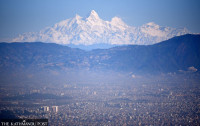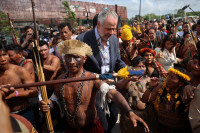Climate & Environment
How Nepal blew a chance to voice its climate concerns
COP27 was an opportunity to draw the world’s attention to losses wrought by climate change in Nepal. The country’s delegation was unprepared.
Abdullah Miya
In the third week of November, when ministers and high-ranking officials from around the world were grappling with climate change negotiations at the UN Climate Change Conference (COP27) in Sharm El-Sheikh, Egypt, Uma Regmi, the Minister of Women, Children and Senior Citizens, who was representing Nepal at the conference, left Sharm El-Sheikh and went on a holiday to Cairo.
Regmi reached Sharm El-Sheikh on November 6 for the 13-day conference that was to be held between November 6 and November 18. The minister was expected to attend the meet until November 14 but four days after landing in Sharm El-Sheikh, she cut her stay short and left for a family vacation to Cairo with her children.
Regmi was accompanied to Sharm El-Sheikh by Saloni Pradhan Singh, member of the Forest and Environment sector within the National Planning Commission, and Dr Pem Narayan Kandel, then secretary of the Ministry of Forest and Environment.
Although other Nepali officials showed active participation in the conference, the minister’s absence was conspicuous, say ministry officials back in Nepal.
Regmi had been given the opportunity to represent Nepal at the conference at the recommendation of Prime Minister Sher Bahadur Deuba. Her holiday in Cairo was facilitated by the Embassy of Nepal there.
The climate conference picked up pace on the fourth day after the initial technical sessions, but Regmi had already left for Cairo by then—at a crucial time for country representatives to actively engage in climate talks and put forth their country’s agenda on the climate crisis.
While Regmi was holidaying in Cairo, planning commission member Singh, representatives of the Forest Ministry including secretary Kandel, other government officials and members affiliated with the climate change sector took charge of the Nepal forum.
One South Asian nation that made a resounding impact at the conference was Pakistan. In stark contrast to Nepal’s representative minister, Senator Sherry Rehman, Pakistan’s federal minister for Climate Change, and a representative of the SAARC nation at the conference, actively took part until the very end. Rehman seemed eager to voice her views during the sessions, especially the high-level meeting on climate finance held on November 9.
Raju Pandit Chhetri, who participated in the climate talks, witnessed Pakistan’s eloquent presentation at COP27. “The proactive approach of Pakistan’s climate change minister and her presentation in the talks caught everyone’s attention,” said Chhetri. “This time, Pakistan, which was leading the G77 and China group, could present its issues in an effective manner.”
The G77 and China group, even during COP26 in Glasgow last year, had raised the issue of a separate financial structure for dealing with climate disasters. “An agreement was reached in Sharm El Sheikh on this issue, something that had been elusive for nearly three decades,” said Chhetri.
According to Chhetri, Pakistan being at the helm of the G77 and China group and the devastating floods and landslides it faced this year, coupled with Pakistan’s representatives’ engagement at the conference, made the agreement on the creation of a separate fund for loss and damage caused by climate change disasters possible.
“Almost every nation has faced some kind of climate change-related disaster. Nepal did as well two years ago in areas like Melamchi, Manang and Mustang,” said Chhetri. “But lack of preparedness for the conference and the minister’s indifference kept Nepal from achieving any significant milestones on climate-induced disasters.”
COP27 was a great opportunity for Nepal to take a stand on the climate crisis. Regmi could have presented Nepal’s problems and the financial resources it needed to tackle the climate crises. “A strong stance from Nepal would have created pressure on the negotiators,” a ministry official told the Post. “But our minister was not present there. Singh spoke on behalf of Nepal in the meeting.”
However, even on days when Regmi was present at the conference, she was a spectator. She did not participate in any of the discourses during the inauguration and closing ceremonies of the high-level segment held on November 7 and 8. Apart from one of the South Asian ministers’ events, where she delivered a prepared speech, Regmi did not speak anywhere else during COP27.
Even while in Sharm El-Sheikh, Regmi failed to follow the schedule prepared by the ministry officials. “We had requested her to speak at two high-level conferences,” an official said. “She, however, ignored us and was rather in a hurry to leave for Cairo.”
In her defence, Regmi said employees at the Ministry of Forests and Environment did not arrange for her to address major events at the global summit. “I got to address only one meeting of the South Asian ministers for which I had prepared myself,” she said.
Regmi had boycotted a review programme of the summit back in Nepal organised by her ministry expressing her discontent over the report that mentioned secretary Kandel leading the Nepali delegation to the summit.
Meanwhile, Rehman put forth her nation’s stance on climate change even during the joint-secretary level meetings where the participants were representatives of non-governmental and international non-governmental organisations.
In the past year, Pakistan has seen the worst climate-induced disasters. In early September, unprecedented flash floods caused by historic monsoon rains washed away roads, crops, infrastructure and bridges, killing at least 1,000 people and affecting more than 33 million people or more than 15 percent of the country’s 220 million population. Early estimates had put the damage from Pakistan’s deadly floods at more than $10 billion.
The Pakistani team was focussed on drawing the world’s attention to climate-induced disasters and demanding climate compensation; Nepal, which has seen its fair share of similar disasters, failed to do so.
Nepal is one of the world’s most vulnerable countries to the climate crisis and has witnessed extreme weather events in the past decade and a half. COP27 was an opportunity for Nepal to build its case in the global forum.
Dr Bimalraj Regmi, a climate negotiator and expert member of the Climate Change and Environment Council chaired by the prime minister, too argued that the climate disaster Pakistan faced during the last monsoon was the main reason for Pakistan’s proactiveness in COP27.
“Pakistan could make a strong moral case, which went down among other countries,” Dr Regmi said.
To his understanding, Pakistan’s participation and engagement during the conference was a testament to their capability, experience and confidence. “Nepal should learn from this experience and prepare a strong group of speakers to participate in international conventions,” said Dr Regmi. “The competence, experience, and confidence of the representatives makes all the difference when it comes to effectively presenting our agenda in international forums.”
As climate change is a layered and complex issue, Dr Regmi suggests the inclusion of experts, and competent individuals from the government and private sectors, along with the environment ministry officials among the negotiators.
Sharing his experience, Dr Santosh Nepal, a water resource and climate change researcher at the International Water Management Institute-Nepal, who was also a participant at the COP27 conference, said that although Nepal’s presence was effective in the side events and other discussions, it failed to do the same in formal negotiations.
“Nepal’s focus should have centred around formal discussions,” he said. “Nepal was ill-prepared for the event. We should learn from this and prepare well for future conferences.”
A developing country like Nepal needs to conduct a lot of internal studies before participating in global conferences. “What criteria will be set to finance the funds, what type of damage will be considered a result of climate change, and what rules and laws will be used to regulate the finances are questions that should be tackled,” said Nepal.
Rajan Thapa, a climate change negotiator and youth participant at COP27, said although Nepal has been facing disasters caused by climate change for years, it was unable to speak during the intervention on climate change discussions and high-level-meetings due to a lack of data on the occurrences and damage caused by such disasters—an opportunity that Pakistan was able to seize.
“Pakistan was able to talk about the horrific floods that hit the country this year and present the necessary data. Pakistan succeeded in registering its concerns at the conference as Senator Rehman herself was involved in negotiations,” he said. “Nepal failed to present the disasters it has suffered at the global forum.”
According to Buddhi Sagar Poudel, joint secretary at the climate change division of the Ministry of Forests and Environment, various ministry officials and experts from different sectors had represented Nepal in 10 interventions during COP27.
“Designated experts participated and spoke on topics such as Adaptation, Finance, Loss and Damage, Global Stock, Mountain Issues, and Gender and Youth,” Poudel told the Post.
The ministry had prepared Nepal’s position paper before participating in COP27 and it was presented accordingly, said Poudel.
Minister Regmi, however, feels that the bureaucracy took over the summit and that the secretary and other staffers tried to take the credit. “The review report falsely states that all the activities were carried out by employees. My role at the summit was left out,” she said. “I was sent by the Cabinet. But the bureaucracy took charge of the summit.”




 17.9°C Kathmandu
17.9°C Kathmandu










